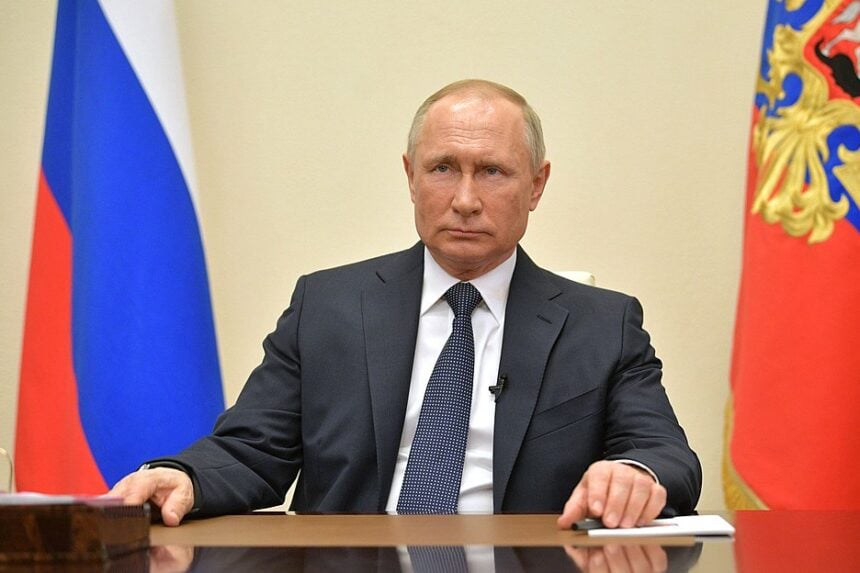President Vladimir Putin spoke to the Russian nation on Wednesday morning, Sept. 21, for the first time since the start of the “special military operation” in Ukraine on Feb. 24. In a televised address, which had been originally scheduled for the evening of Sept. 20, Putin announced partial mobilization of Russia’s reservists to boost operations. He also said that areas of Ukraine under Russian control would hold referenda on their future ties to Russia, hinting at the prospect of their annexation. Putin alluded to the Kremlin’s own strategic documents to suggest that not only Russia’s current territory but also any regions annexed to it following the referenda—the self-proclaimed republics of Donetsk and Luhansk as well as the Kherson and Zaporizhya regions—would be under the nuclear umbrella of the Russian Federation.
Immediately after Putin’s address, Defense Minister Sergei Shoigu announced that 300,000 reservists with previous military experience would be called up. Shoigu appeared keen to stress the limited scope of mobilization, saying that only a small fraction of Russia’s 25 million potentially available recruits would be called up. He also made a soon-to-be-disputed claim that just under 6,000 Russian servicemen and more than 10 times that many Ukrainian soldiers have been killed in action since the hostilities started seven months ago.
Putin’s decision appears to be a palliative measure, which is unlikely to turn the tide of war to Russia’s favor any time soon. It will take several months to mobilize and deploy hundreds of thousands of reservists. The ability of the Russian military establishment to retrain and equip such a large contingent on short notice is uncertain at best. Although only men with prior military experience will be called up, it should be noted that—unlike most of their Western counterparts—Russian veterans do not receive periodic refresher training after discharge.
Putin’s decision is nevertheless likely to antagonize millions of Russians—especially those belonging to the urban middle class—who had supported the “special military operation” for as long as it did not affect them directly. One rare point of agreement between Putin’s supporters and detractors is that most of these people do not perceive the objective in Ukraine as an issue over which they would be prepared to risk their lives, or those of their offspring. On the other hand, partial mobilization will not satisfy Putin’s increasingly vocal nationalist detractors, who detest what they see as his reluctance to mobilize all national resources to force the issue.
A yawning gap exists between the threat to Russia from the West, as presented by Putin and Shoigu, and the likely strategic impact of the “limited mobilization” they have just announced. In his address, Putin accused “some Western elites” of wanting to “weaken, divide and ultimately destroy” Russia, and he warned that “we will use all the means at our disposal to defend ourselves.” Shoigu was equally explicit: “I cannot help but emphasize that today we are at war not only with Ukraine and the Ukrainian army, but with the collective West.”
If Putin and Shoigu are to be taken seriously, if Russia is facing an existential threat from the “collective West,” which requires that all the means at its disposal be used, then calling up 300,000 reservists is a woefully inadequate response. It makes sense only if it is meant to be the first step in preparing the country for a long-term test of endurance—one which cannot stop short of total mobilization, both military and economic. Some observers of the Moscow scene believe that Putin may suspect that Russia is not ready for such a leap and that he therefore prefers an incremental approach while keeping the nation relatively insulated from the war.
In addition to facing these strategic difficulties, Putin is restrained on the foreign front by the growing dissatisfaction of the countries that have been supportive of Russia in the past. China clearly signaled its concern over the protracted struggle, first with an editorial in Global Times and then by an unexpected meeting between the Chinese foreign minister and his Ukrainian counterpart at the United Nations on Sept. 22. Also at the UN, India reiterated what Prime Minister Narendra Modi said to Putin at the Shanghai Cooperation Organisation summit in Samarkand: now is not the time for war.
Turkey’s maverick President Recep Tayyip Erdoğan went so far as to demand the return of Crimea, not to Ukraine but to “its rightful owners,” the Tatars, “our descendants … who are living there.” Even Kazakhstan’s President Kassym-Jomart Tokayev has broken ranks with Russia at the UN General Assembly, though he owes his political and personal survival to Putin. Armenia is also gradually turning its back on Russia, partly out of disappointment at its nominal protector’s failure to respond to Azeri provocations.
Given his performance in recent months, it is likely that Putin’s decision to proclaim partial mobilization was forced on him and presents the limit of what he is prepared to risk domestically. Contrary to the image of a calculating chess player—part Machiavelli, part Clausewitz—Putin is both risk-averse and hesitant when faced with major decisions. His failure to intervene in Ukraine when the odds were favorable and the cause plausible—following the coup of February 2014 and the massacre at Odessa in May—is illustrative of his temperament.
The war will continue—probably at a reduced level of intensity with the onset of bad weather—to the detriment of both parties and to the delight of global hegemonists in Washington and their Eurocratic minions. The arrival of significant Russian reinforcements, starting around January 2023, may help stabilize the front lines—primarily in the vulnerable Kherson region in the south—but it will not lead to any radical change in the strategic balance. It is an ongoing tragedy with no feasible scenario for resolution on the horizon.
image: Vladimir Putin address to citizens 2020-04-02 (from: Kremlin.ru, CC BY 4.0, via Wikimedia Commons)

Leave a Reply